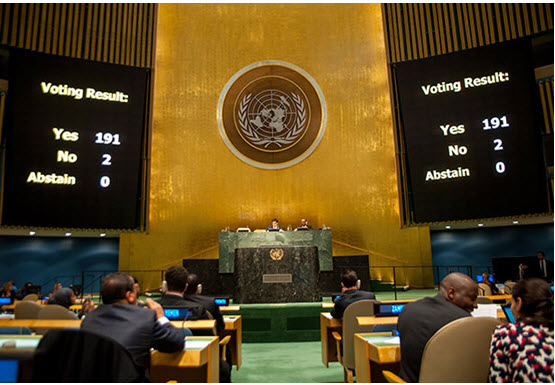The United Nations General Assembly voted 191 to 2 in favor of lifting the blockade against Cuba on Tuesday, October 27, with only the United States and Israel voting against.

Results of last Tuesday’s vote on the US blockade against Cuba are displayed in the United Nations General Assembly. (Photo: United Nations)
According to Telesur, the initiative has been backed by the majority of members for the last 23 years. Secretary-General Ban Ki-moon presented a report that concludes that the economic sanctions, which have caused some US$834 billion in damages to the Caribbean island, should be lifted. Moments before the vote took place, the US representative to the UN declared that his country would vote against lifting the sanctions, saying that it was unfortunate that Cuba had presented a motion that was “almost identical” to the one the year before.
His speech followed that of Cuban Foreign Minister Bruno Rodriguez, who demanded that the US end its “flagrant, massive and systematic violation of the human rights of all Cubans” by terminating the half-century financial and economic blockade. Rodriguez pointed out the company Electra refused to supply Cuban hospitals with drugs to combat cancer. Rodriguez indicated that the blockade “is contrary to international law … It has been described as an act of genocide” And added “We hope that US moves forward form a cruel and unjust policy anchored in the past and adopts a policy based on the feelings of its own citizens.”
UN representatives from the Caribbean Community and Common Market and the South American regional bloc, Mercosur, both congratulated the United States and Cuba for re-establishing relations, but also called on the United States to lift the blockade against Cuba. “The time has come to put an end to this unilateral embargo,” said the Paraguayan representative, speaking on behalf of Mercosur.
For the last three years, 188 of the 193 members have voted in favor of ending the blockade on Cuba, with the United States and Israel being the persistent exceptions. In order for the measure to be passed, the vote must be unanimous. The resolution is named the “Necessity of ending the economic, commercial and financial embargo imposed by the United States of America against Cuba.” It expresses concern over the international legality of the US economic and financial siege against the Caribbean island.
US President Barack Obama noted in July that the blockade had failed. Since then, he has often hinted that it would soon be lifted. But despite beginning a path to normalize bilateral dealings, including lifting some travel and trade bans to the socialist island, the sanctions continue, as a change of policy needs to be passed by Congress. Cuban President Raul Castro has reiterated that in order for full relations to be re-established, the United States must meet four conditions: to leave Guantanamo detention camp; end the blockade; end the “wet-foot-dry-foot” law encouraging Cubans to pursue residency in the US; and end anti-government radio and television broadcasts to the island.
Related:
- Fearing Republican Congress, Israel Won’t Publicly Support US-Cuba Thaw
- Fidel Castro slams Israel’s offensive in Gaza
- Fidel Castro again slams Israel’s deadly Gaza offensive
- Fidel Castro praises Venezuela’s assistance to Gaza Strip Palestinians
- The Communist Party of Cuba supports the struggle of the Palestinian people to regain all their rights


